#Soloheadbeg Ambush
Text
#OTD in 1920 – Tomás Mac Curtain is elected Sinn Féin Mayor of Cork city.
After Sinn Féin’s sweeping victory in the November 1918 general election and the setting up of the First Dáil in 1919 it was clear that the British government and the Republicans were on a collision course. The War of Independence began with the Soloheadbeg ambush on the same day that the First Dáil met.
Tomás MacCurtain took an active role in the War of Independence. Originally from…

View On WordPress
#1916 Easter Rising#Ballyknockane#Co. Cork#Dáil Eireann#Gaelic League#IRB#Irish War of Independence#Lloyd George#Lord Mayor of Cork#Republican#RIC#Sinn Fein#Soloheadbeg Ambush#Tomás Mac Curtain
5 notes
·
View notes
Link
First Dáil opened in #Ireland #OTD 1919, not much coverage in French press, but the following day 'Excelsior' had front page photos of tanks in #Dublin. Military presence possibly due to the Jan 21 1919 Soloheadbeg ambush of British by Republicans that killed two.
23 notes
·
View notes
Text
It Seems Like Nothing Changes
Paul Cussen
January 1919

This is the year that sees the publication of Yeats’ The Wild Swan’s at Coole, Francis Ledwidge’s Complete Poems, and ‘An Seabhac’, Pádraig Ó Siochfhradha’s Jimín Mháire Thaidhg, the year in which Poe’s Tales of Mystery and Imagination is published with illustrations by Harry Clarke.

C.S. Lewis publishes his first work in London, Spirits in Bondage: a cycle of lyrics.
Other publications of note are:
Sherwood Anderson’s Winesburg, Ohio
Herman Hesse’s Demian
Franz Kafka’s In der Strafkolonie (‘In the Penal Colony’)
W. Somerset Maugham’s The Moon and Sixpence
Marcel Proust’s À l'Ombre des jeunes filles en fleurs, vol. 2 of À la recherche du temps perdu
P.G. Wodehouse’s My Man Jeeves stories
Virginia Woolf’s Night and Day
L. Frank Baum’s The Magic of Oz
The War Poems of Siegfried Sassoon
Father Francis P. Duffy’s Father Duffy's Story: A Tale of Humor and Heroism, Of Life and Death with the Fighting Sixty-Ninth (with Joyce Kilmer)
John Maynard Keynes’ The Economic Consequences of Peace
Prof. William Strunk’s magnificent The Elements of Style
Sapper Dorothy Lawrence: The Only English Woman Soldier, and
Arthur Ransome’s Six Weeks in Russia
The Little Review was seized by the Post Office in January, not because of the contribution by James Joyce, but because of the inclusion of some nude drawings.
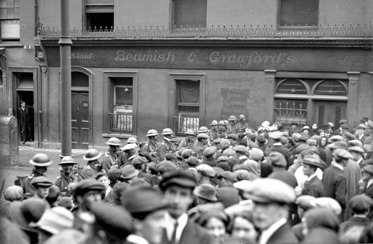
In mid-January approximately 5,000 soldiers mutiny in Southampton, taking over the docks and refusing to obey orders. Lies had been told and the men had thought they were to be discharged when they were being sent to France. Sir Hugh Trenchard surrounded the mutineers with soldiers and military police.
There was a melee between US sailors and British soldiers on board the Rosslare express train from Cork. Most of the windows were broken when the train arrived in Waterford and a number of the American sailors were injured. One was missing, and was later found, fighting fit, in Dungarvan.
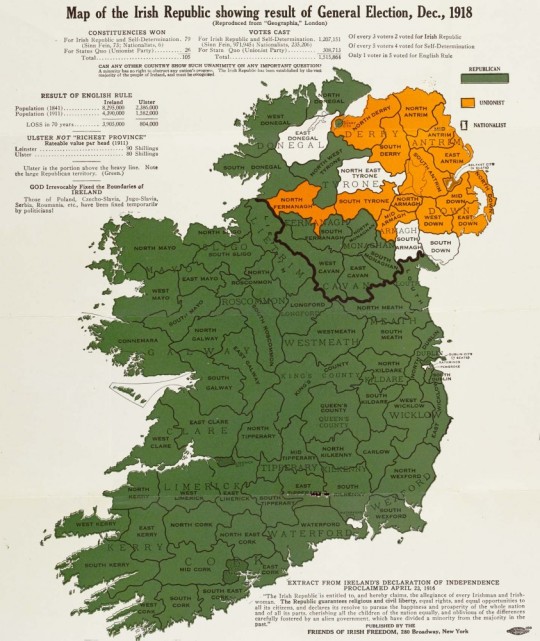
In Belfast more than 20 Sinn Féin prisoners climbed on to the roof of the prison where, over the course of two hours, they waved republican flags and sang Sinn Féin and other songs to a large crowd that assembled on Crumlin Road. Their protest ended when members of the crowd began throwing stones at the protesters on the roof despite a police presence.
‘I can declare that the spirit of the prisoners, so far from being broken, has grown more robust since their entrance to the jail.’ - Count Plunkett
‘In January, 1919, Cork Brigade, which was made up of about twenty battalions and embraced the whole of Cork County, was divided into three Brigades. Our Battalion (Bandon) became the 1st Battalion, Cork III. Brigade.
The other battalions in the Brigade area were, as far as I can recollect, - Clonakilty (2nd), Dunmanway (3rd), Skibbereen (4th), Bantry (5th).
The 0/C., Cork III. Brigade, was Tom Hales who, up to the formation of the Brigade, was O/C. Bandon (1st) Battalion. I cannot recollect the names of the other officers on the Brigade Staff.
During 1919, beyond normal training, which was becoming slightly more advanced -selected members were being trained in scouting, signalling and the use of arms - there was no unusual activity in Company area.’ – Laurence Sexton.
http://www.bureauofmilitaryhistory.ie/reels/bmh/BMH.WS1290.pdf#page=5
1 January - Count Plunkett stays in his house in Upper Fitzwilliam Street in Dublin after being released from Birmingham Jail, having served seven months imprisonment.
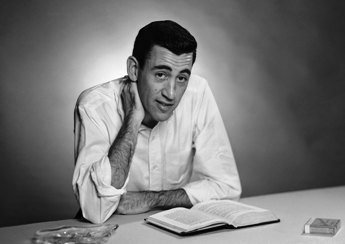
Jerome David Salinger is born in Manhattan (d. 2010)
Edsel Ford succeeds his father as president of the Ford Motor Company.
HMY Iolaire hits the infamous "Beasts of Holm" rocks and sinks a mile from Stornoway harbour. Over 200 people drown in the tragedy.

2 January - The Cork Examiner reproduces a Daily Express article entitled ‘Why the Women Failed’ as 17 women had stood for election and only Countess Markievicz was elected. Two women had stood for election in Ireland; Winifred Carney failed to secure the seat for the Victoria Ward in Belfast.
3 January - The Faisal-Weizmann Agreement is signed for the development of a Jewish homeland in Palestine.
Tragic Week begins in Argentina as striking workers fire on police. Three policemen die over the course of the week and 78 are wounded. Between 100 and 700 civilian deaths are reported along with 2,000 wounded, while 50,000 people are imprisoned. Martial law is declared.

5 January - The Sparticist uprising begins in Berlin.

6 January - Theodore Roosevelt dies in his sleep (b. 1858)
7 January - A reception is held at the Imperial Hotel by the members of the Cork branch of the Irish Women's Association for almost 300 Munster men who had been prisoners of war.
Robert Duncan is born in Oakland, California (d.1988)
The Christmas Rebellion in Cetinje begins in response to an attempt to unite the Kingdom of Montenegro with the Kingdom of the Serbs, Croats and Slovenes.
The Industrial and Commercial Workers' Union of South Africa is founded, led by Clements Kadalie.
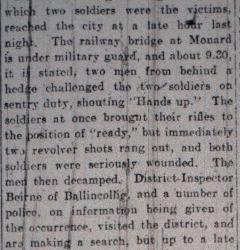
10 January - Private Harman and Private Perry of the Royal Defence Corps were shot on sentry duty at the railway bridge in Monard.
The newly formed Freikorps attack Sparticist supporters in Berlin.
13 January - Workers councils in Berlin end the general strike bringing the Sparticist uprising to an end.
15 January - Proportional Representation is used for first time in Sligo municipal elections.
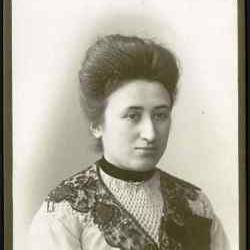
Rosa Luxemburg (b. 1871) is arrested along with Karl Liebknecht (the only member of the Reichstag to have voted against the war, b.1871) for their part in the Sparticist uprising. They are murdered by members of the Freikorps. Luxemburg’s body is thrown in the Landwehr Canal in Berlin.
Red Rosa now has vanished too. (...)
She told the poor what life is about,
And so the rich have rubbed her out.
May she rest in peace.
- Bertolt Brecht

The Great Boston Molasses Flood occurs when a large storage tank bursts and a wave of two million gallons of molasses travels at over 50 km/h through the North End killing 21 and injuring 150.
16 January - The 18th Amendment to the American Constitution is ratified, authorizing Prohibition.
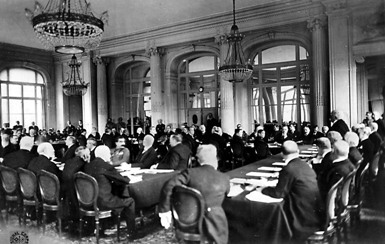
18 January - The Paris Peace Conference opens at the Palace of Versailles.
Bentley Motors Limited is founded.
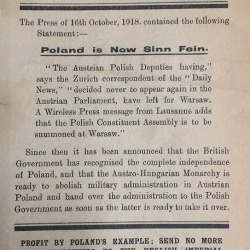
Pianist and composer, Ignacy Jan Paderewski becomes the Prime Minister of Poland.
19 January - The first elections in Germany of the new Weimar Republic.
20 January - Silva Kaputikyan is born in Yerevan (d. 2006)
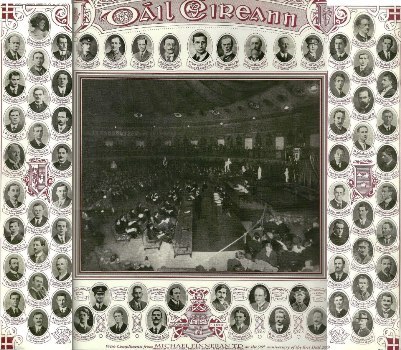
21 January - The first meeting of Dáil Éireann, formed by Sinn Féin MPs elected to the House of Commons, is conducted exclusively in Irish. Cathal Brugha takes the chair and calls on Father O’Flanagan to bless the proceeding. Clár Oibre Poblacánaighe, the Democratic Programme, is adopted.
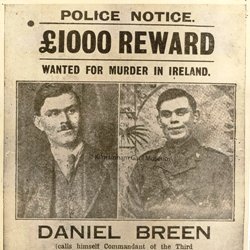
An ambush is carried out at Soloheadbeg, Co Tipperary, by Irish Volunteers. Two RIC officers are killed; Constable James McDonnell, approximately 50 years old, was from Belmullet, County Mayo, a widower with four children; and Constable Patrick O'Connell was from Coachford, County Cork, approximately 30 years old and unmarried.
25 January - The League of Nations is founded in Paris.
26 January - Stoker 1st Class John McSweeney of Fuller’s Lane, Bandon Road dies of nephritis.
The 1918 All-Ireland hurling final is held in Croke Park.
Limerick 9-5 Wexford 1-3
27 January - A general strike is called over working hours led by engineering workers in Glasgow and Belfast.

31 January - The editorial of An t-Óglach states that the formation of Dáil Éireann “justifies Irish Volunteers in treating the armed forces of the enemy – whether soldiers or policemen – exactly as a National Army would treat the members of an invading army”
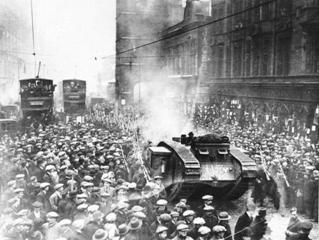
The British army is called in to deal with Scotland’s most widespread strike since 1820. Six tanks support 12,000 troops and the strikers give up their cause for a 40 hour work week after the Battle of George Square. Ironically, Glasgow citizens gave more per capita to fund the army’s tanks when “Julian the Tank” (No. 113) made a tour of Scotland in January 1918 as a Scottish War Savings Committee initiative. The tanks are not used against the public; their presence supporting the soldiers is enough.
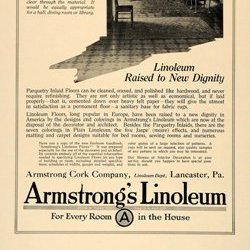
0 notes
Text
L’attacco, si presume contro la Courthouse in Bishop Street, è stato attribuito alla New IRA. Il suo primo attacco di questo genere, dopo anni
https://twitter.com/i/status/1086755920749711365
Sul sito di Saoradh, partito repubblicano dalla linea dura, si legge che l’attacco bomba segna il centenario del primo attacco della Guerra d’Indipendenza, nel 1919.
“Questo attacco arriva alla vigilia del centenario dell’agguato di Soloheadbeg, quando Sean Treacy e i suoi commilitoni misero a segno un colpo storico contro le Crown Forces di Tipperary”, dice il post. “Sembra che 100 anni dopo i compagni del volontario Sean Tracey continuino la rivoluzione incompiuta”.
Elisha McCallion, dello Sinn Fein, ha condannato l’attacco, confermando che non c’è alcun ferito.
Fonte Irish Republican News
https://twitter.com/i/status/1086755633238630401
Immagini tratte da Twitter
Car bomb explodes in Derry; no injuries reported (Irish Republican News)
Derry city courthouse has been apparently targeted tonight in a car bomb attack. The shock bombing in Bishop Street is being linked to the ‘new IRA’, its first such attack in years.
The PSNI tweeted an image of the explosion near the city’s courthouse on Bishop Street.
Internet posts by hardline republican party Saoradh pointed out that the “mine attack” had taken place on the centenary of the first attack of the War of Independence, in 1919.
“This attack comes on the eve of the centenary of the Soloheadbeg ambush when Sean Treacy and his comrades struck a historic blow against the Crown Forces in Tipperary,” the post said. “It seems 100 years later Volunteer Sean Tracey’s comrades continue the unfinished revolution.”
Sinn Fein’s Elisha McCallion, condemned the attack and said she believed nobody had been injured.
“This incident has shocked the local community,” she said.
“In particular, there are many elderly residents who live in the area who have been alarmed by this incident. Thankfully no one appears to have been injured.”
DERRY, AUTOBOMBA ATTRIBUITA ALLA ‘NEW IRA’ L'attacco, si presume contro la Courthouse in Bishop Street, è stato attribuito alla New IRA. Il suo primo attacco di questo genere, dopo anni…
#autobomba#car bomb#crown forces#derry#derry courthouse#featured#Irish Republican Army#irish republican news#new IRA#sinn fein
0 notes
Photo

JANUARY 21 notes :
1911 – The first Monte Carlo Rally takes place.
1915 – Kiwanis International is founded in Detroit.
1919 – Meeting of the First Dáil Éireann in the Mansion House Dublin. Sinn Féin adopts Ireland's first constitution. The first engagement of the Irish War of Independence, the Soloheadbeg ambush, County Tipperary.
1925 – Albania declares itself a republic.
1954 – The first nuclear-powered submarine, the USS Nautilus, is launched in Groton, Connecticut by Mamie Eisenhower, the First Lady of the United States.
1960 – Little Joe 1B, a Mercury spacecraft, lifts off from Wallops Island, Virginia with Miss Sam, a female rhesus monkey on board.
1961 – Four hundred thirty-five workers are buried alive when a mine in Coalbrook, Free State, South Africa collapses
1968 – Vietnam War: Battle of Khe Sanh: One of the most publicized and controversial battles of the war begins.
1968 – A B-52 bomber crashes near Thule Air Base, contaminating the area after its nuclear payload ruptures. One of the four bombs remains unaccounted for after the cleanup operation is complete.
1971 – The current Emley Moor transmitting station, the tallest free-standing structure in the United Kingdom, begins transmitting UHF broadcasts.
1976 – Commercial service of Concorde begins with the London-Bahrain and Paris-Rio routes.
1981 – Production of the iconic DeLorean DMC-12 sports car begins in Dunmurry, Northern Ireland, United Kingdom.
1997 – The U.S. House of Representatives votes 395–28 to reprimand Newt Gingrich for ethics violations, making him the first Speaker of the House to be so disciplined.
1999 – War on Drugs: In one of the largest drug busts in American history, the United States Coast Guard intercepts a ship with over 4,300 kilograms (9,500 lb) of cocaine on board.
2003 – A 7.6 magnitude earthquake strikes the Mexican state of Colima, killing 29 and leaving approximately 10,000 people homeless.
2004 – NASA's MER-A (the Mars Rover Spirit) ceases communication with mission control. The problem lies in the management of its flash memory and is fixed remotely from Earth on February 6.
BIRTH : 1905 – Christian Dior, French fashion designer, founded Christian Dior S.A. (d. 1957)
1922 – Telly Savalas, American actor (d. 1994) { TV : “ Kojak “ }
1938 – Wolfman Jack, American radio host (d. 1995)
1940 – Jack Nicklaus, American golfer and sportscaster
1942 – Mac Davis, American singer-songwriter, guitarist, and actor
DEATH : 1924 – Vladimir Lenin, Russian lawyer and politician (b. 1870)
1998 – Jack Lord, American actor, director, and producer (b. 1920) { TV series : Hawaii Five-O }
1999 – Susan Strasberg, American actress (b. 1938)
2002 – Peggy Lee, American singer (b. 1920)
OBSERVANCE : National Hugging Day (United States) NOTE : National Hugging Day is an annual event dedicated to hugging. It was created by Kevin Zaborney[1][2] and occurs annually on January 21. The day was first celebrated on January 21, 1986 in Clio, Michigan, USA.[3] The holiday is also observed in many other countries.[4][5] The idea of National Hug Day is to encourage everyone to hug family and friends more often.[1] Zaborney cautions to ask first if one is unsure of the response. :)
FOR MORE INFO , GO HERE : https://en.wikipedia.org/wiki/National_Hugging_Day
#escritoire-for-the-light#on this date - history#tv stars - NASA - Lenin - tumblr#HUGS#fashion - sports car#war on drugs#military#war#USA - aviation
3 notes
·
View notes
Text
Events 1.21
763 – The Battle of Bakhamra between Alids and Abbasids near Kufa ends in a decisive Abbasid victory.
1525 – The Swiss Anabaptist Movement is founded when Conrad Grebel, Felix Manz, George Blaurock, and about a dozen others baptize each other in the home of Manz's mother in Zürich, breaking a thousand-year tradition of church-state union.
1535 – Following the Affair of the Placards, French Protestants are burned at the stake in front of the Cathedral of Notre Dame de Paris
1720 – Sweden and Prussia sign the Treaty of Stockholm.
1749 – The Teatro Filarmonico in Verona is destroyed by fire. It is rebuilt in 1754.
1774 – Abdul Hamid I became Sultan of the Ottoman Empire and Caliph of Islam.
1789 – The first American novel, The Power of Sympathy or the Triumph of Nature Founded in Truth, is printed in Boston.
1793 – After being found guilty of treason by the French National Convention, Louis XVI of France is executed by guillotine.
1861 – American Civil War: Jefferson Davis resigns from the United States Senate.
1893 – The Tati Concessions Land, formerly part of Matabeleland, is formally annexed to the Bechuanaland Protectorate, now Botswana.
1908 – New York City passes the Sullivan Ordinance, making it illegal for women to smoke in public, only to have the measure vetoed by the mayor.
1911 – The first Monte Carlo Rally takes place.
1915 – Kiwanis International is founded in Detroit.
1919 – Meeting of the First Dáil Éireann in the Mansion House Dublin. Sinn Féin adopts Ireland's first constitution. The first engagement of the Irish War of Independence, the Soloheadbeg ambush, County Tipperary.
1925 – Albania declares itself a republic.
1931 – Sir Isaac Isaacs is sworn in as the first Australian-born Governor-General of Australia.
1941 – Sparked by the murder of a German officer in Bucharest, Romania, the day before, members of the Iron Guard engaged in a rebellion and pogrom killing 125 Jews.
1948 – The Flag of Quebec is adopted and flown for the first time over the National Assembly of Quebec. The day is marked annually as Québec Flag Day.
1950 – American lawyer and government official Alger Hiss is convicted of perjury.
1954 – The first nuclear-powered submarine, the USS Nautilus, is launched in Groton, Connecticut by Mamie Eisenhower, the First Lady of the United States.
1960 – Little Joe 1B, a Mercury spacecraft, lifts off from Wallops Island, Virginia with Miss Sam, a female rhesus monkey on board.
1960 – Avianca Flight 671 crashes and burns upon landing at Montego Bay, Jamaica killing 37. It is the worst air disaster in Jamaica's history and the first for Avianca.
1961 – Four hundred thirty-five workers are buried alive when a mine in Coalbrook, Free State, South Africa collapses.
1968 – Vietnam War: Battle of Khe Sanh: One of the most publicized and controversial battles of the war begins.
1968 – A B-52 bomber crashes near Thule Air Base, contaminating the area after its nuclear payload ruptures. One of the four bombs remains unaccounted for after the cleanup operation is complete.
1971 – The current Emley Moor transmitting station, the tallest free-standing structure in the United Kingdom, begins transmitting UHF broadcasts.
1976 – Commercial service of Concorde begins with the London-Bahrain and Paris-Rio routes.
1981 – Production of the iconic DeLorean DMC-12 sports car begins in Dunmurry, Northern Ireland, United Kingdom.
1997 – The U.S. House of Representatives votes 395–28 to reprimand Newt Gingrich for ethics violations, making him the first Speaker of the House to be so disciplined.
1999 – War on Drugs: In one of the largest drug busts in American history, the United States Coast Guard intercepts a ship with over 4,300 kilograms (9,500 lb) of cocaine on board.
2000 – Ecuador: After the Ecuadorian Congress is seized by indigenous organizations, Col. Lucio Gutiérrez, Carlos Solorzano and Antonio Vargas depose President Jamil Mahuad. Gutierrez is later replaced by Gen. Carlos Mendoza, who resigns and allows Vice-President Gustavo Noboa to succeed Mahuad.
2003 – A 7.6 magnitude earthquake strikes the Mexican state of Colima, killing 29 and leaving approximately 10,000 people homeless.
2004 – NASA's MER-A (the Mars Rover Spirit) ceases communication with mission control. The problem lies in the management of its flash memory and is fixed remotely from Earth on February 6.
2005 – In Belmopan, Belize, the unrest over the government's new taxes erupts into riots.
1 note
·
View note
Text
On This Day...

On this day in 1922, Michael Collins, the Commander-in-Chief of the Irish National Army and major figure in the Irish War of Independence, was shot and killed in an ambush set by members of the Irish Republican Army in the waning days of the Irish Civil War. Collins was a controversial figure in Ireland for his steadfast patriotism, but also for his support for the Anglo-Irish Treaty which ended the War of Independence, which was a direct cause of the Civil War between Irish republicans.
Ireland had been dominated by British rule since the reign of Henry II in the 12th century. Revolts against British rule and the Anglo-Irish Protestant aristocracy that evolved over the centuries, were common as the majority Catholic population sought to end London’s influence. By the 19th century, Irish nationalists began seeking Home Rule through political means. The Irish Parliamentary Party won seats in the British Parliament--Ireland had disbanded its own Parliament in 1800 as part of the Act of Union--and sent members to London to seek greater Irish political rights, including the right to self-determination. The outbreak of World War I in 1914 led to a temporary halt of the Home Rule movement, as party leader John Redmond pledged to support the British government as war with Germany loomed. By 1916, the frustration of Irish nationalists over the lack of progress on Home Rule and the prospect of mandatory conscription into the British military, led to a paroxysm of violence; the Easter Rising of 1916.
After several days of fighting and widespread destruction in Dublin, British troops put down the Rising and summarily executed its senior leaders, James Connolly and Patrick Pearse, among others. Michael Collins fought in the Rising and was captured at the Rising’s headquarters in the General Post Office of Dublin on April 29. Collins was sent with other prisoners to an internment camp in Wales along with other mid-level commanders. There they formed the core of the next generation of Sinn Féin, the Irish independence movement founded by Arthur Griffith in 1905. Collins was openly critical of the tactics used during the Easter Rising, complaining that movements by independent commanders which divided the strength of the Rising’s fighters by occupying exposed positions away from the General Post Office in central Dublin, contributed to the Rising’s failure. This criticism and Collins’ natural leadership skills brought him to Griffith’s attention. Collins became one of Griffith’s senior lieutenants in Sinn Féin.
In December 1918, Britain held a general election, the first in eight years. In a stunning upset, the relatively moderate Irish Parliamentary Party lost most of its seats to the radical Sinn Féin. As with other senior Sinn Féin leaders, Collins was elected to a seat, winning the constituency of Cork South. But Collins and his colleagues refused to take their seats in Westminster*, instead they formed their own “national assembly” in Dublin and began the process of electing a head of government and cabinet ministers. This assembly declared the existence of the Irish Republic in January 1919, and recognized the IRA as its national army. Collins was appointed Minister of Finance by Éamon de Valera, the new president who had succeeded Arthur Griffith as the leader of Sinn Féin. While political maneuvering took place in Dublin, a unit of the IRA ambushed and killed two officers of the Royal Irish Constabulary at Soloheadbeg in Tipperary. This act provoked a British military response. The Irish War of Independence was underway.
Collins was appointed director of intelligence for the IRA and sought to undertake a guerilla war against the British Army and their despised auxiliary units, the Black and Tans and the Auxies. Collins created a unit, called The Squad, to root out such British agents and sympathizers by assassination. By 1920, the British government was offering a bounty of £10,000 for Collins, dead or alive. In 1921, faced with an increasingly widespread and violent uprising in Ireland that continued to suck up resources with no end in sight, the government in London proposed a truce, which de Valera accepted. In October 1921, Collins was among a delegation sent to London to negotiate a treaty with the British government. In December, the exhausted British government agreed to recognize a limited Irish state in the Catholic majority counties in the south and west of the island, but retained control of the Protestant majority counties in the northeast around Belfast. The Irish Free State remained within the British Empire, but in practice was an independent state in all but name, with full control over its domestic and foreign policy.
Though the Anglo-Irish Treaty was a great victory for Irish nationalists, it split Sinn Féin into rival factions, with anti-Treaty members, centered around the more militant IRA, expressing outrage that Collins and Griffith--who had led the delegation to London--had betrayed their fellow Irishmen in the north, but allowing Britain to maintain a social and political enclave on the island. IRA leaders preferred to continue its campaign of violence against the British and would only be satisfied when the authority of London was completely removed from Ireland as a whole. The treaty was heatedly debated in Dublin between January and June 1922, with tensions high throughout the countryside. De Valera, still sitting as president, opposed the treaty and when it passed the assembly by a vote of 64-57, de Valera called on all those who opposed the treaty to stand with him, splitting the government and setting the stage for violent confrontation between the two factions.
Collins was among those that attempted to assuage anti-Treaty members, but in April1922, a unit of the IRA occupied the Four Courts, the center of Ireland’s court system. Collins was tasked with putting down this insurrection and he laid siege to the building in central Dublin, but refrained from firing any shots, seeking a diplomatic solution instead. Collins took a core of pro-Treaty members of the IRA and formed them into the National Army. Britain, seeking to undermine anti-Treaty insurgents, secretary supplied artillery to Collins. On June 22, the Dublin government ordered the IRA unit in Four Courts to withdraw or face “imminent military action.” On June 28, using the British-supplied artillery, the National Army units besieging Four Courts opened fire. The next day, the Courts were stormed by National Army soldiers. This action kicked off a week of street battles in Dublin, that lasted until July 5. While there is no direct evidence, it was, and is, generally assumed that Collins gave the order to open fire.
Collins assumed the title of Commander-in-Chief of the National Army and within weeks he began to quietly reach out to anti-Treaty leaders in the south, near Cork, to seek to end the violence. On August 12, 1922, Arthur Griffith, Collins’ mentor, died. Collins and many IRA leaders attended the funeral. On August 21, Collins resumed his tour of the south, meeting with neutral IRA leaders in and around Cork to arrange a peaceful settlement between the Free State government and the anti-Treaty holdouts. The next day, August 22, a unit of anti-Treaty fighters witnessed Collins and his small convoy travel down a stretch of road outside West Cork. Expecting him to return later in the day, they set an ambush.
That evening, between 7:30pm and 8:00pm, Collins’ convoy drove through the ambush spot where it was stopped by a cart left in the road by the ambush column. They opened fire on the convoy with a machine gun. Collins was struck in the head and was killed almost immediately. He was the only person to be hit.
Collins’s body was returned to Dublin, where it lay in state in Dublin City Hall for three days. He was given a state funeral and buried as a hero of Irish Independence and the burgeoning republic.
* Sinn Féin continues to win seats in Northern Ireland to this day, but following the example of Collins and others in 1918, they refuse to travel to London to sit at Westminster.
#On This Day#RTARLAD#history#Ireland#Michael Collins#Irish Civil War#Irish War of Independence#Eamon de Valera#Sinn Fein#Irish Parliamentary Party#Irish Home Rule#Easter Rising#politics#independence#Northern Ireland#Anglo-Irish Treaty#Arthur Griffith#IRA#terrorism#Irish nationalism#Irish republicans#Britain#parliament
0 notes
Text
#OTD in 1969 – Death of Politician and IRA leader during the War of Independence and Civil War, Dan Breen.
Dan Breen was an iconic IRA figure in both the War of Independence and also the Civil War. Breen was involved in what is accepted as the first action of the War of Independence (1919-1921) when with Sean Treacy and others, he ambushed and killed two RIC (Royal Irish Constabulary) constables James McDonnell and Patrick O’Connell, both of them Catholic and reputedly popular in the community in what…
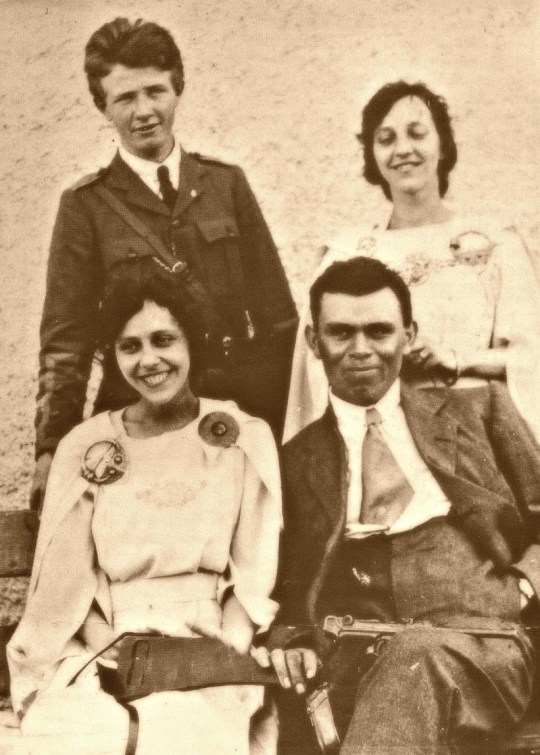
View On WordPress
#anti-Treaty#Brigid Malone#Dan Breen#Dáil Eireann#History#History of Ireland#IRA#Ireland#Irish Civil War#Irish History#Irish War of Independence#Royal Irish Constabulary#Sean Treacy#Sinn Fein#Soloheadbeg Ambush#Tipperary
5 notes
·
View notes
Text
#OTD in 1920 – Tomás Mac Curtain is elected Sinn Féin Mayor of Cork city.
After Sinn Féin’s sweeping victory in the November 1918 general election and the setting up of the First Dáil in 1919 it was clear that the British government and the Republicans were on a collision course. The War of Independence began with the Soloheadbeg ambush on the same day that the First Dáil met.
Tomás MacCurtain took an active role in the War of Independence. Originally from…

View On WordPress
#1916 Easter Rising#Ballyknockane#Co. Cork#Dáil Eireann#Gaelic League#IRB#Irish War of Independence#Lloyd George#Lord Mayor of Cork#Republican#RIC#Sinn Fein#Soloheadbeg Ambush#Tomás Mac Curtain
7 notes
·
View notes
Text
#OTD in 1894 – Birth of nationalist revolutionary and politician, Dan Breen, in Grange, Donohill, Co Tipperary.
One of the most famous fighters in the fight for Irish freedom, Dan Breen is born in Co Tipperary. He was an iconic IRA figure in both the War of Independence and also the Civil War.
Breen was involved in what is accepted as the first action of the War of Independence 1919-1921 when with Sean Treacy and others, he ambushed and killed two RIC constables James McDonnell and Patrick O’Connell, both…
View On WordPress
#1916 Easter Rising#anti-Treaty#Co. Tipperary#Dan Breen#Donohill#Grange#IRA#Irish Civil War#Irish War of Independence#nationalist revolutionary#Politician#RIC#Sean Tracy#Soloheadbeg Ambush
5 notes
·
View notes
Text
#OTD in 1969 – Death of Politician and IRA leader during the War of Independence and Civil War, Dan Breen.
#OTD in 1969 – Death of Politician and IRA leader during the War of Independence and Civil War, Dan Breen.
Dan Breen was an iconic IRA figure in both the War of Independence and also the Civil War. Breen was involved in what is accepted as the first action of the War of Independence (1919-1921) when with Sean Treacy and others, he ambushed and killed two RIC (Royal Irish Constabulary) constables James McDonnell and Patrick O’Connell, both of them Catholic and reputedly popular in the community in what…
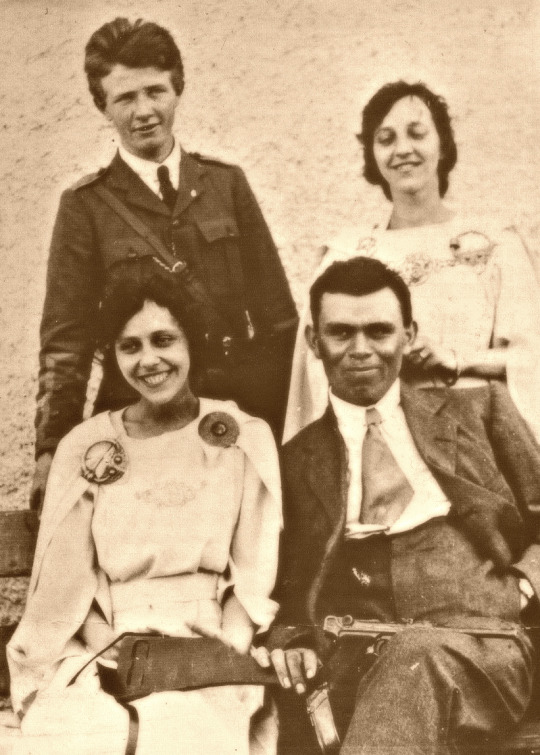
View On WordPress
#anti-Treaty#Brigid Malone#Dan Breen#Dáil Eireann#History#History of Ireland#IRA#Ireland#Irish Civil War#Irish History#Irish War of Independence#Royal Irish Constabulary#Sean Treacy#Sinn Fein#Soloheadbeg Ambush#Tipperary
6 notes
·
View notes
Text
#OTD in 1919 – Dan Breen and Seán Treacy rescue their comrade Seán Hogan from a Dublin-Cork train at Knocklong, Co Limerick; two policemen guarding him are killed.
#OTD in 1919 – Dan Breen and Seán Treacy rescue their comrade Seán Hogan from a Dublin-Cork train at Knocklong, Co Limerick; two policemen guarding him are killed.
In one of the most dramatic events in the Irish War of Independence, a handcuffed young Tipperary volunteer, Seán Hogan, was rescued from a train while sat between four armed members of the Royal Irish Constabulary (RIC). Two RIC were killed in the attack and a number of the volunteers wounded. The rescue was undertaken by three of Hogan’s comrades from the Third Tipperary Brigade of the IRA and…
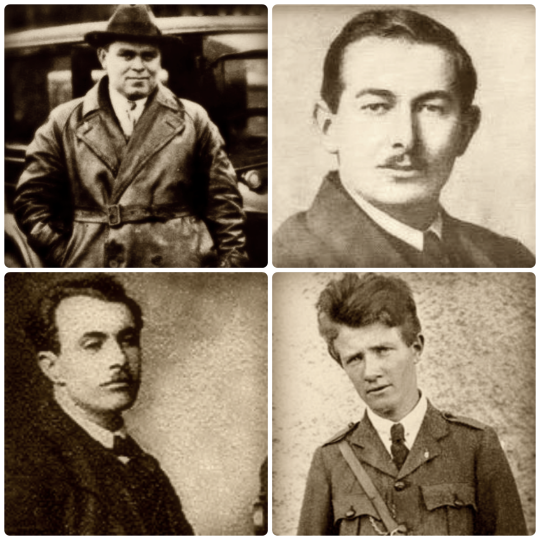
View On WordPress
#"Big Four"#3rd Tipperary Brigade#3rd West Cork Flying Column#Co. Limerick#Danny Lacey#Dublin-Cork train#IRA East Limerick Brigade#Ireland#Irish History#Irish War of Independence#Jim Scanlon#Knocklong#RIC#Royal Irish Constabulary#Soloheadbeg Ambush
8 notes
·
View notes
Text
#OTD in 1894 – Birth of nationalist revolutionary and politician, Dan Breen, in Grange, Donohill, Co Tipperary.
#OTD in 1894 – Birth of nationalist revolutionary and politician, Dan Breen, in Grange, Donohill, Co Tipperary.
One of the most famous fighters in the fight for Irish freedom, Dan Breen is born in Co Tipperary. He was an iconic IRA figure in both the War of Independence and also the Civil War.
Breen was involved in what is accepted as the first action of the War of Independence 1919-1921 when with Sean Treacy and others, he ambushed and killed two RIC constables James McDonnell and Patrick O’Connell, both…
View On WordPress
#1916 Easter Rising#anti-Treaty#Co. Tipperary#Dan Breen#Donohill#Grange#IRA#Irish Civil War#Irish War of Independence#nationalist revolutionary#Politician#RIC#Sean Tracy#Soloheadbeg Ambush
6 notes
·
View notes
Text
#OTD in 1919 – Two members of Royal Irish Constabulary are shot dead by Irish Volunteers including Seán Treacy and Dan Breen in an ambush at Soloheadbeg, Co Tipperary.
At Soloheadbeg the war began,
And the next was heard the song
Of the rescue of Seán Hogan
At the Station of Knocklong.
On the same day, the first Dáil was meeting, an ambush takes place at Soloheadbeg, Co Tipperary that is now seen as being the opening skirmish in the War of Independence.
An unauthorised attack led by Seán Treacy and Dan Breen resulted in the deaths of two RIC constables, James…
youtube
View On WordPress
#Ambush#Co. Tipperary#Dan Breen#Dáil Eireann#Guerilla warfare#History of Ireland#Irish History#Irish War of Independence#James McDonnell#Patrick O’Connell#RIC#Sean Treacy#Soloheadbeg#Youtube
5 notes
·
View notes